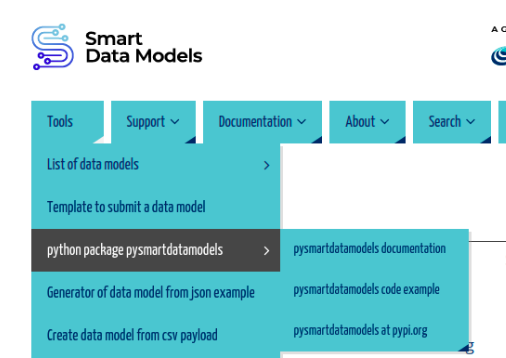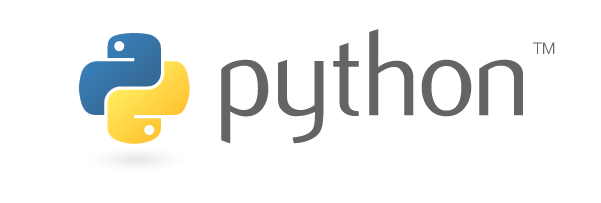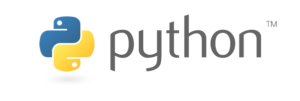New options for pysmartdatamodels package. There are a new element in he tools menu to access the pysmartdatamodels package, its documentation, or a code example.

New options for pysmartdatamodels package. There are a new element in he tools menu to access the pysmartdatamodels package, its documentation, or a code example.

Thanks to the IUDX we have a new data model to describe the water distribution network of a locality.
Reach them at the new subject water distribution
Some of the data models available are generated according to some ontologies (like dataModels.OSLO). The @context provided for the subject includes IRIs with the smartdatamodels by default, however, the use of official ontologies can be required.
In order to allow this the file notes_context.jsonld was created and also included in the contribution manual (seection 1.5 slide 23).
Now the service for mapping the external ontologies (Home -> tools -> Mapper @context with external ontologies) can detect that instead of a regular configuration file a notes_context.jsonld is provided and applies the replacement of terms defined there.
It can be also used as an API call, in this link you have an example https://smartdatamodels.org/extra/create_external_referenced_context.php?localContext=https://raw.githubusercontent.com/smart-data-models/dataModel.OSLO/master/context.jsonld&configOntologies=https://raw.githubusercontent.com/smart-data-models/dataModel.OSLO/master/notes_context.jsonld
The structure of the notes_context.jsonld has to follow the template
“@context”: {
“Term1”: “uri_term_1”,
“Term2”: “uri_term_2”,
}
}
There is a new version of the python package for smart data models pysmartdatamodels 0.5.41
Changelog:
– The README include now the basic documentation of each function
Now you can find in pypi.org the python package pysmartdatamodels with 13 functions for the integrators of the data models (more than 800) in external systems and applications. It is a beta version. There is a function, update_data() that whenever is run, it updates the data models to the last version (including adding the new data models). The code is available at the utils directory.
This python package includes all the data models and several functions (listed below) to use in your developments.
If you want to be updated on this package you can join this mailing list (Announcements are sent only when something relevant happens). We love to get your feedback at info@smartdatamodels.org
There are several online tools to manage and to create the data models, generate examples or to adapt to existing ontologies. See the tools menu option at the home site.
1- List all data models. Function list_all_datamodels()
2- List all subjects. Function list_all_subjects()
3- List the data models of a subject. Function datamodels_subject(subject)
4- List description of an attribute. Function description_attribute(subject, datamodel, attribute)
5- List data-type of an attribute. Function datatype_attribute(subject, datamodel, attribute)
6- Give reference model for an attribute. Function model_attribute(subject, datamodel, attribute)
7- Give reference units for an attribute. Function attributes_datamodel(subject, datamodel)
8- List the attributes of a data model. Function attributes_datamodel(subject, datamodel)
9- List the NGSI type (Property, Relationship or Geoproperty) of the attribute. Function ngsi_datatype_attribute(subject, datamodel, attribute)
10- Print a list of data models attributes separated by a separator. Function print_datamodel(subject, datamodel, separator, meta_attributes)
11- Returns the link to the repository of a subject. Function subject_repolink(subject)
12- Returns the links to the repositories of a data model name. Function datamodel_repolink(datamodel)
13- Update the official data model list or the database of attributes from the source. Function update_data()
1.- Create a proper documentation
2.- Function to allow submission of improvements (i.e. missing recommended units or model) and comments to the different data models. Currently, you can do it by searching for your data model here
https://smartdatamodels.org/index.php/list-of-data-models-3/ visiting the github repo and making your PR or raising your issues there.
3.- Function to submit a new data model to an incubation repository. Currently, this is done manually incubated repository. By filling this form you are granted to contribute with new data models.
4.- Include new functions like search for the subject of a data model or other that you can suggest to us at info@smartdatamodels.org
### some example code
from pysmartdatamodels import pysmartdatamodels as sdm
subject = "dataModel.Weather"
dataModel = "WeatherForecast"
attribute = "precipitation"
print(sdm.list_all_datamodels())
print(sdm.list_all_subjects())
print(sdm.datamodels_subject("dataModel.Weather"))
print(sdm.description_attribute(subject, dataModel, attribute))
print(sdm.datatype_attribute(subject, dataModel, attribute))
print(sdm.model_attribute(subject, dataModel, attribute))
print(sdm.units_attribute(subject, dataModel, attribute))
print(sdm.attributes_datamodel(subject, dataModel))
print(sdm.subject_repolink(subject))
print(sdm.datamodel_repolink(dataModel))
print(sdm.print_datamodel(subject, dataModel, ",", ["property", "type", "dataModel", "repoName", "description", "typeNGSI", "modelTags", "format", "units", "model"]))
sdm.update_data()
There is a new file ‘schema.sql‘ in all the directories of the data models. It is a SQL script for PostgreSQL.
The script creates the structure of a relational table containing the attributes defined in the data model. It also creates the data types for those attributes with an enumeration of values.
For those attributes being arrays or objects, it creates a JSON attribute (allowed in PostgreSQL).
If you need additional features in this export please report them to info@smartdatamodels.org.
See an example.
Now we have a draft version of a python package to integrate the smart data models with your developments. It is a beta version so you can expect some issues when using it. We will be glad if you report it at info@smartdatamodels.org or suggest new features. Thanks to Anthony Uphof for his contributions (only a few of them are in this draft, next version will include them)
To install
pip install -i test.pypi.org/simple/ pysmartdatamodels
The functions included are:
1- List all data models. Function list_all_datamodels()
2- List all subjects. Function list_all_subjects()
3- List the data models of a subject. Function datamodels_subject(subject)
4- List description of an attribute. Function description_attribute(subject, datamodel, attribute)
5- List data-type of an attribute. Function datatype_attribute(subject, datamodel, attribute)
6- Give reference model for an attribute. Function model_attribute(subject, datamodel, attribute)
7- Give reference units for an attribute. Function attributes_datamodel(subject, datamodel)
8- List the attributes of a data model. Function attributes_datamodel(subject, datamodel)
9- List the NGSI type (Property, Relationship or Geoproperty) of the attribute. Function ngsi_datatype_attribute(subject, datamodel, attribute)
11- Print a list of data models attributes separated by a separator. Function print_datamodel(subject, datamodel, separator, meta_attributes)
12- Update the official data model list or the database of attributes from the source. Function update_data()

A new data model for water quality prediction is being released based on the actual use cases. Located at the water quality subject.
Thanks to the project https://www.digital-water.city/ for its contribution
Thanks to the contributors.
In the main menu, it has been extended the submenu of list data models with a complete database of all versions of the data models.
It includes not only the data model, subject, and version but also the data directly linked to the raw version of the data model.
You can find it at Home -> List of data models -> List of data models versions.
In the tools option of the main menu, there are a few services to help you to use, create and debug your data models.
Although working, some of these services are limited. We are releasing the code for some of the services to allow you to contribute with improvments.
It appears by the end of the page with texts like this:
“source code of this service if you want to improve it.”
Source code has an hyperlink pointing to the specific script in the utils directory.
They are created in python and connected to the WP forms in each option
Specifically
